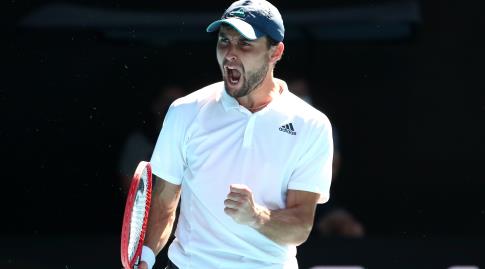

Asi Maman 14/02/2021 11:04

Aslan Kratzb celebrates (Reuters)
These days, tennis players in Israel are rubbing their eyes. This past weekend a new name burst into the skies of the tennis world, but to those who live the industry in the country it sounds familiar. Aslan Kratzb, the “anonymous tennis player” who qualified for the quarterfinals of the Australian Open, grew up and was educated in Israel – and today he competes under the Russian flag.
Kratzb’s road in Australia started with three qualifying rounds, when in the first game he had to reach a tiebreaker. Later, he defeated the Bulgarian Igor Gersimov by defeating him 6: 0, 6: 1 and 6: 0. He then met the Jewish-Argentine Diego Schwartzman and also defeated him in an excellent game. In his next game, against Canadian Felix Hamster-Eliasima, he got into trouble but eventually managed to win and qualify for the quarterfinals of the tournament.

In the quarterfinals, Kratzb was supposed to meet Dominic Tim, but fortunately last year’s finalist was eliminated after losing to Gregor Dimitrov, who will take his place in the fight against the anonymous tennis player who grew up in Israel. If Kurtzav manages to surprise the Bulgarian as well and qualify for the semi-finals, it will be a huge sensation – and of course, another miss of Israeli tennis.
Kratzev, 27, was born in Buldikwkaz, Russia, but immigrated to Israel with his family as a child. He played tennis with Amir Weintraub at the Jaffa Tennis Center every day and sometimes also practiced at Yad Eliyahu. He was considered a talented player with potential, but suffered from behavioral and financial problems that prevented him from progressing. “He did not have a single worn penny,” said a source in Israeli tennis who knew him closely.

Until the age of 16 he remained in the country and eventually decided to leave back to Russia with his father, while his mother and sister remained in the country. He started training alone in his homeland, as well as in Germany and Spain, and even went to competitions without a coach. For years he traveled around the world on his own, living from hand to mouth and without much success, until he broke out in recent days at the Australian Championships and before that also won the ATP tournament.
About a year ago, Kratzb came to Israel to settle his personal affairs. He wanted to keep his Israeli passport because he did not enlist in the IDF, but eventually testified that he served in the Russian army and received an exemption. He trained for two days in Hadar Yosef and to the surprise of those present, he still spoke Hebrew fluently.

Last September, Amir Weintraub turned to the incoming chairman of the Tennis Association, Avi Peretz, and told him about Aslan Kratzb, after learning that Peretz had decided to bring another approach to the Israeli industry that says no player should be given up regardless of his personal background. He came to play in the national team after seeing that he had registered for the Davis Cup games on behalf of Russia but did not play in the media, and Weintraub and Peretz approached him and tried to see if he would like to represent Israel, but Kratzb had already lost interest and politely declined.
And here, a few months later, Kratzb is recording a relatively late but still meteoric breakthrough and qualifying for the Australian Championship quarter-finals. “Aslan, and I’m not kidding when I say that, is our secret weapon,” Daniel Medvedev, a member of the Russian national team, said of him recently. Thus, from a tennis player lacking financial means, within two weeks he will receive worldwide recognition and also two fat checks for winning the ATP tournament and qualifying for the final stages of the Australian Championship. According to estimates, for just what he did in Australia he is likely to get almost half a million dollars into his bank account.

And beyond the money, Kratzb is expected to jump in the world rankings from 114th place to top 65 in the world. If he manages to do the unbelievable and also advance to the semi-finals, he may enter the top 42, then he will receive 720 ranking points – and all this within two magical weeks that the boy who grew up in Israel went through and left the country to fulfill a dream. A kid who was hugely successful, but in fact is also a huge miss of the system.


